By Timothy Cahill ’16 M.A.R.
Following the 2015 murders of nine Black church members by a white gunman at Emanuel AME Church in Charleston, S.C., the Rev. Dr. Norvel Goff, Sr. ’91 M. Div. had to call on everything he’d learned, seen, and held in faith for 65 years to serve as interim pastor to the traumatized congregation.
Goff’s storehouse included, of course, his theological education at Yale and beyond, a lifetime of reading and studying Scripture, decades of pastoral leadership and care, and an intimate familiarity with the community of “Mother Emanuel,” as the historic church is known. It held as well a reflective and articulate awareness of what it means to be Black in a country founded on the original sin of slavery and racist doctrines. Finally, his response was molded by his Southern roots, the lessons of history learned from his Gullah Geechee ancestors, and ancestral ties to the soil and waters of the Carolina Low Country.
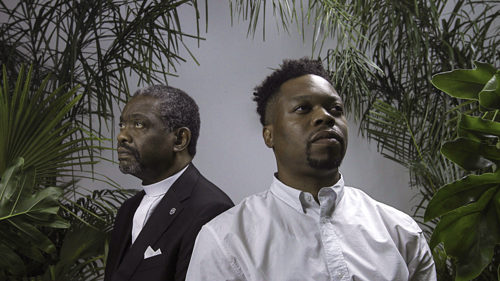 These resources allowed Goff to carry the church, the Charleston community, and the nation through dark days of mourning, memorials, and an appetite for vengeance following the attack, and lead a watching world in acts of healing, forgiveness, and grace.
These resources allowed Goff to carry the church, the Charleston community, and the nation through dark days of mourning, memorials, and an appetite for vengeance following the attack, and lead a watching world in acts of healing, forgiveness, and grace.
Among those most closely following Rev. Goff’s ministry was his son, Jon-Sesrie Goff. A filmmaker and multimedia artist, Jon drew from his father’s strength, mercy, and wisdom to complete his own odyssey of faith and creation. It took the first-time director eight years to complete his 2022 documentary, After Sherman. Begun before the massacre at Mother Emanuel, the picture became suffused with the attack’s myriad meanings, in particular the part played by the elder Goff. After Sherman is, above all, a meditation on Jon’s father as teacher and paragon, eminence and influence, source and point of departure. Throughout the documentary, the filmmaker confronts subjects at once intimate and expansive: family, memory, and the formation of the self.
Broken promises
The documentary’s title refers to U.S. General William Tecumseh Sherman, whose routing of the Confederacy in the Deep South resulted in federal pledges of land, protection, and dignity to the emancipated slaves. By implication, then, After Sherman also points to the truth that these promises were never kept, and the 150-plus years of self-reliance, struggle, and strength needed for the freed Africans and their heirs to make it on their own.
Much of the film takes place amid the Gullah Geechee people of South Carolina, descendants of West and Central Africans enslaved in the lower Atlantic states from North Carolina to Florida. After the Civil War, the Gullah Geechee settled in relative isolation on coastal plantations and barrier islands, preserving the language, food, art, and spiritual practice of their African ancestors. This communal memory lasted for generations, but since the 1960s has come under increasing threat by economic forces including Northern migration and encroachment by real estate and resort developers. Georgetown, S.C., Rev. Goff’s birthplace and the epicenter of After Sherman, lies 35 miles south of Myrtle Beach and 60 miles north of Charleston.
The director presents his father’s hometown as sacred, if slightly alien, ground. Jon was born in New England, came of age in upstate New York, and is based now in Brooklyn. Nevertheless, his father declares in a voice-over at the film’s outset, “There’s a birthplace and there’s a home place. Your birthplace is Hartford, Connecticut. Your home is Georgetown, South Carolina.”
“Yeah, but what makes it … home?” Jon wonders as the camera pans Georgetown’s coastal marshes. “I’m Gullah,” he says, “born in exile.”
Goff’s documentary is an inquiry into this divided identity told in many forms—historical narrative, reportage, biography, interview, memoir—that together amounts to an extended film essay. The discursive approach was the most authentic way to frame the story, Jon explained when we spoke by phone.
“I was what I call an ‘unreliable expert,’” he said. “I wasn’t an investigative journalist. I wasn’t an historian. So, I had to be honest to my voice … and be vulnerable enough to approach [the material] in the essay form.”
In the spirit of essay, the documentary adopts a lyric visual style that combines Goff’s own evocative camerawork (in addition to director and writer, he is credited as chief cinematographer) with a patchwork of home movies, archival footage, family snapshots, animation, and collage. The sound design is equally textured, with hymns, old spirituals, jazz, and contemporary music, and a Greek chorus of voices of family members, elders, and others from Georgetown, Charleston, and elsewhere.
And overarching it all are the words of the Rev. Dr. Goff, in voiceovers, on-camera interviews, sermons, vintage recordings, reminiscences, and reflections on religion and faith. From the opening titles to the closing credits, the filmmaker puts the viewer (and himself) in constant engagement with his father’s voice and worldview.
‘A towering figure’
Norvel Goff, Sr. was born in 1949, in the heart of the Jim Crow South, surrounded by Gullah family and neighbors. After graduating in 1971 from Morris Brown College, a historically Black school in Atlanta, he moved to Hartford, where he worked in politics and business and served as president of the state chapter of the NAACP, the National Association for the Advancement of Colored People.
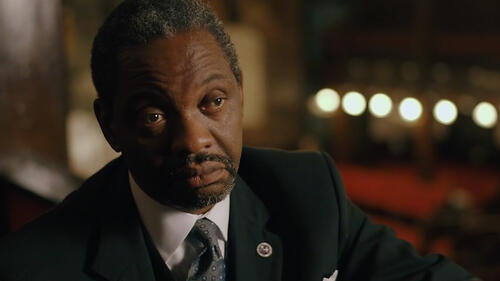 Goff was nearly 40 when he entered Yale Divinity School, where his professors included a young Cornel West. “Professor West had a very active and energetic class,” Goff recalled during a recent telephone interview. He “allowed us to engage in constructive conversation … in both the classroom exercises as well as taking time with students.”
Goff was nearly 40 when he entered Yale Divinity School, where his professors included a young Cornel West. “Professor West had a very active and energetic class,” Goff recalled during a recent telephone interview. He “allowed us to engage in constructive conversation … in both the classroom exercises as well as taking time with students.”
Goff graduated with an M. Div. in 1991, and moved to Rochester, N.Y., to become pastor of Baber AME Church, where he served until 2004. In Rochester, he established the Faith Community Alliance and again was president of the NAACP chapter. “He was a towering figure,” a colleague, the Rev. Marlowe Washington, told USA Today in 2015.
In the documentary, Jon includes TV news footage of his father successfully negotiating with Kodak, then the region’s heavyweight employer, to reverse race-based pay disparities and address a companywide culture of racism.
Goff “made the church (the) forefront of social justice,” Washington said.
Amid this activity, Goff also earned a Doctor of Ministry in Transformative Ministry from Colgate Rochester Crozer Divinity School.
After Rochester, Goff returned to the South, and in 2015 was named presiding elder of the South Carolina 7th District of the AME Church. This position, which he still holds today, requires overseeing operations of 33 congregations, including Emanuel AME. It was in this context that he was named Interim Pastor following the shooting. There is a chilling moment in After Sherman when father and son discuss the massacre across a picnic table, when the elder Goff speaks almost in passing of “the racist terrorist who entered Mother Emanuel Church at a bible study where your mother and I just left twenty minutes earlier.”
Before her death in 2021, Ann Marie Goff spent her life at her husband’s side, working with him on church and social justice affairs. Jon said during our interview that he’d grown up with a lingering fear for his parents’ safety. But, “there was no more frightening evening” than June 17, 2015, enduring “the long minutes between hearing of the shooting and confirming that my parents were safe and not a part of it.”
“I was trying to get to them, you know, and they were so busy taking care of other things,” he recalled. It was a scenario that was uncomfortably familiar, he allowed, the sense of being at one remove from his parents’ attention.
“For a child and a young person who wants to have their parent all to themselves—or their parents, in my case, because my mom was also incredibly active and involved in his ministry—you want your parents all to yourself, but they’ve got to go campaign, they’ve got to go to church, they’ve got to do all these other things for other people. That was hard growing up.”
The documentary helped Goff make peace with childhood disappointments and accept that “having someone who is truly in the ministry, truly for the community and for the improvement of society, comes with sacrifices.”
Power of forgiveness
After Sherman has numerous moments when the Goff men come together, including a stagey tableau of them seated slightly turned away from one another, framed by potted palms.
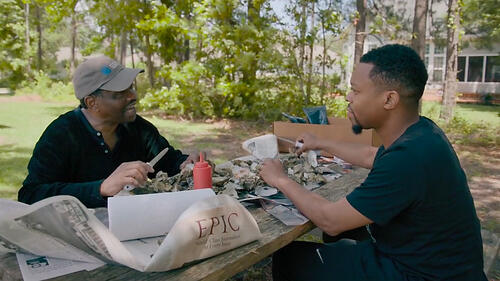 But the most powerful encounter is at that picnic table, where they share a meal as the elder Goff recalls the Mother Emanuel tragedy and declares his belief in the power of forgiveness.
But the most powerful encounter is at that picnic table, where they share a meal as the elder Goff recalls the Mother Emanuel tragedy and declares his belief in the power of forgiveness.
“When you forgive, it does not mean that I and others are void of anger, tears, and outright madness,” he explains, as the men feast on oysters. “But it has to be managed, and it has to be harnessed, and that energy has to be used in a positive way. So, when I talk about forgiveness [for the murderer], the fact of the matter is, I refuse to give that person or any other person that kind of control over my life. To have me held hostage by hatred.”
“There’s always evil in the world,” Rev. Goff concludes, “but the good news is … that love and goodness outflank hatred and fear.”
Jon stares straight ahead, saying nothing. It’s not clear how he regards this trust in the goodness of the world.
“There’s always a deep cynicism among my generation around the ministry and religion,” he said in our interview. And the expression on the younger man across the picnic table might be read as skepticism toward his father’s faith. It could be understood equally as a silence born of respect for beliefs that demand more than a hasty reply.
“What I was trying to express in the documentary was that forgiveness does not mean the absence of justice,” Rev. Goff explained when we spoke. “Particularly when it comes to the massacre of the Emanuel Nine in Charleston. But we are called, those of us who are faith believers, if we are to be forgiven, we must forgive.”
The film addresses the attack entirely from the point of view of the pastor’s response. There is no replay of the event itself—no surveillance photo of the killer entering the church, no recap of his arrest and trial, no footage of President Obama singing Amazing Grace. The narrative lingers entirely on the soulful, high-minded forgiveness of Goff. The force of his leadership is made all the greater when it is set against interviews with younger men whose anger remains palpable.
“There’s still people out here who talk about how Dad saved the city of Charleston,” Jon’s older brother, Norvel Goff, Jr., says off-camera in After Sherman. “Black folk, they’ll talk to me, like, ‘We were gonna burn this place down. Your father saved this city.’ Nobody talks about it, but the Black folk know… . There’s only one person who kept that city from being burnt to the ground.”
Love letter
Though only 90 minutes long, the documentary includes an ambitious range of subjects. It explores the meaning of Christianity to Southern Black identity. It reveals a younger generation returning from urban life to the land, farming, crab fishing, preserving their heritage by reclaiming the old knowledge and wisdom. It watches women weaving sweetgrass baskets, and young girls learning traditional dances. It attends a “delinquent tax auction,” where the Gullah Geechee heirs must compete for ownership of their ancestral lands against wealthy white investors.
“When I grew up, everybody in my community was Black,” one man says. “Now, the community that we live in, we can count the Black folks probably on one hand, maybe two hands.”
“Never sell the land,” instructs the elder Goff. “Where your people are buried will always be home.”
Above all, though, After Sherman charts the path Jon Goff traveled over the years he worked on the film, from his feeling of fractured identity to a realization of the depth of his connection.
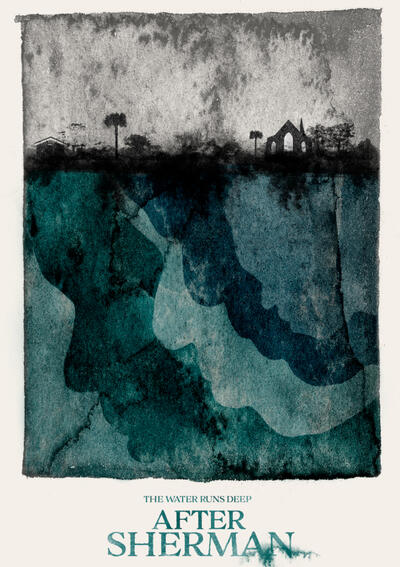 “What Jon and his team have achieved is a love letter,” observes Dr. Elijah Heyward III ’07 M.A.R., consulting producer on the film.
“What Jon and his team have achieved is a love letter,” observes Dr. Elijah Heyward III ’07 M.A.R., consulting producer on the film.
“It’s a love letter that’s a special expression of the father-son experience; a love letter to the Christian experience by way of justice and activism—I can think of no better case study than Rev. Goff and how he led not only the church, but the community and the nation at a pivotal time. It’s a love letter to the Gullah Geechee community.”
Heyward grew up in Beaufort, S.C., Gullah Geechee on both sides of his family. After graduating from YDS in 2007, he earned a Ph.D. in American Studies at the University of North Carolina. He is a past member of the Yale Alumni Association Board of Governors and the Divinity School’s alumni board, and currently serves on the YDS Dean’s Advisory Council.
Heyward assisted on the production as “scholarly advisor, sounding board, and friend,” he said. He is seen on screen with Jon, fishing and explaining that his father insisted that he know “how to catch food … in order to be authentically part of this community.” One of the documentary’s virtues, he said, are the “images of possibility” it provides to a Gullah community that is more generally represented in the facile terms of tourist narratives. In contrast, After Sherman speaks “in a voice that offers complexity, beauty, and a sense of understanding.”
“I’m excited about the documentary,” said Rev. Goff, “because it forces one to really think about where you are and where society is and where you’d like it to be. And the only way that can happen is that you become an active participant to bring about transformative change in a constructive way.”
Filmmaking is a kind of ministry of its own, I observed. Jon is carrying on the family work.
“Yes, and he has a lot of it in him,” Goff agreed. The pastor looked ahead to the “future documentaries and other things” his son will create, “to guide, direct, emulate, and encourage persons of goodwill to do even greater things, as a result of pricking the consciences of individuals and groups in our society.”
“I’m proud of him,” he said.
Where hope comes from
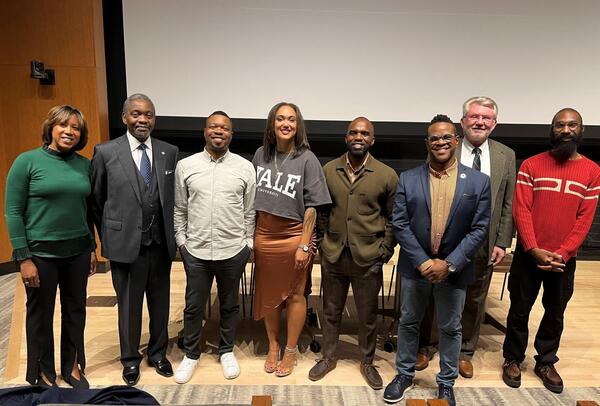 After Sherman has been shown in festivals from Santa Barbara to Tribeca, and from the National Gallery in Washington, D.C. to the Yale campus, where in September 2022 the Goffs and Dr. Heyward led a screening and talk-back co-sponsored by YDS. The picture had its international debut the following month at the British Film Institute London Film Festival and will be broadcast nationally later this year on the PBS series “POV.” The program is one of the project’s co-producers.
After Sherman has been shown in festivals from Santa Barbara to Tribeca, and from the National Gallery in Washington, D.C. to the Yale campus, where in September 2022 the Goffs and Dr. Heyward led a screening and talk-back co-sponsored by YDS. The picture had its international debut the following month at the British Film Institute London Film Festival and will be broadcast nationally later this year on the PBS series “POV.” The program is one of the project’s co-producers.
Near the beginning of the picture, Jon narrates his impressions of his father’s birthplace—“a community where you can still feel the presence of the period of enslavement for Africans. You can drive down the streets and see houses where folks were formally in servitude. You can see fields where folks worked. And in these spaces, there’s not really much hope right here. You have to ask yourself, where does hope come from?”
I turned this question back onto him. Where, in an America of Mother Emanuel massacres and George Floyd murders, does hope come from for a young Black man?
He paused for a long moment. “From something greater than you or me,” he answered. “A higher power.”
At that moment, I thought, he sounded a lot like his father.
“Sounds like religion,” I said.
“Yeah,” he replied. “Sounds like faith.”
Timothy Cahill ‘16 M.A.R. writes on religion and art.